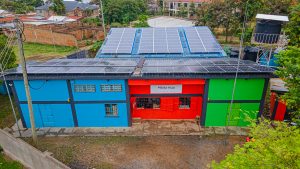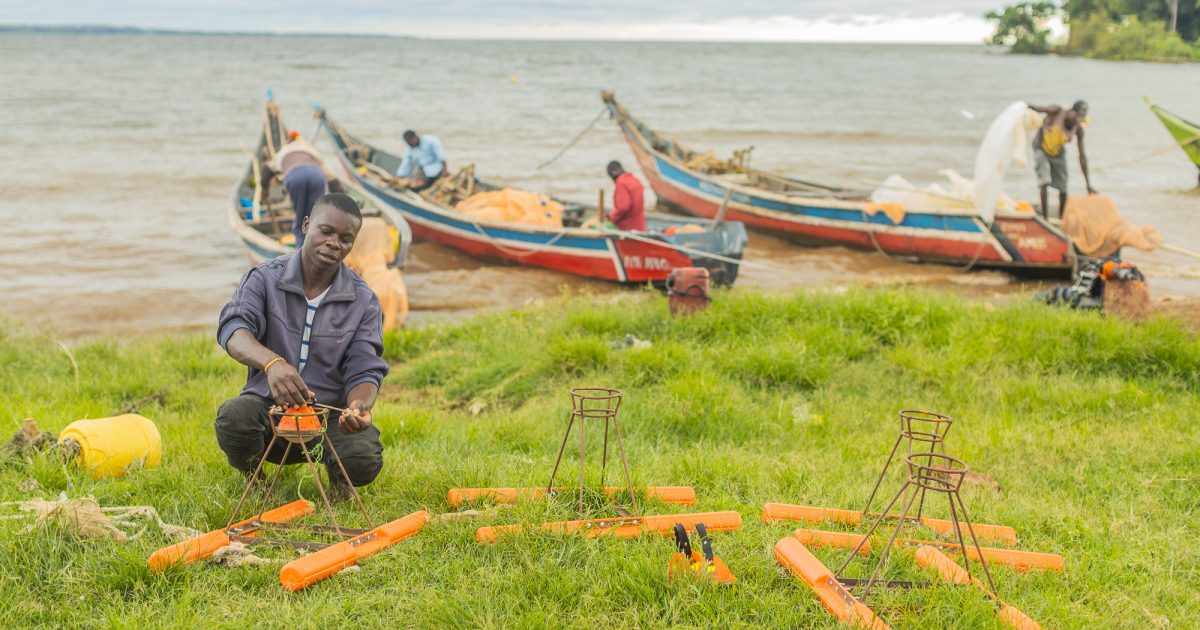Advancements in renewable energy technologies are transforming the lives of small-scale fishermen in Lake Victoria, who are increasingly swapping their kerosene lanterns for eco-friendly and cost-effective solar lamps.
Saddam Hussein, who has been a fisherman at Nyachebe Beach in Homa Bay for 15 years, describes night fishing with kerosene as highly inefficient, hazardous, costly, and harmful to the environment.
Fishermen use solar-powered lights at night to attract Lake Victoria Sardine, commonly known as Omena, into their nets.
“The introduction of solar lanterns has significantly transformed our trade and boosted our profit margins while also helping us contribute to environmental conservation,” said Hussein.
Hussein recounted that since he joined the fishing industry, he has witnessed fishermen transition through various lighting sources noting initially, everyone used traditional paraffin-powered lamps, which emitted thick smoke into the atmosphere and were easily extinguished by strong winds.
Later, he revealed the fisher folk transitioned to pressure lamps, which would go off within a few hours after casting their nets, resulting to poor catches. Then came the era of lead-acid batteries, where fishermen connected wire cables to bulbs and car batteries to produce light.
“However, this method also posed several challenges, such as insufficient battery power to sustain fishing throughout the night and a lack of knowledge about connecting the lights properly, leading to mini explosions whenever the connections were done haphazardly,” he added.
The Kenya Marine and Fisheries Research Institute (KMFRI) estimates that there are approximately 48,000 small-scale fishers on the Kenyan side of Lake Victoria which translates to the use of thousands of kerosene lamps on the lake every night, emitting over 35 million tonnes of carbon dioxide (CO2) annually and contributing significantly to global warming.
To reverse this trend, a social enterprise organization called WeTu Hub Victoria Limited has established over 14 solar-powered energy hubs around Lake Victoria. These hubs support over 4,000 fishermen from Migori, Homa Bay, Kisumu, and Siaya counties with sustainable solar fishing lanterns.
According to Anthony Ochieng’, a fisherman based at Nyandiwa Beach, the solar lanterns are inexpensive, efficient, and easy to use.

Ochieng’ mentioned that he spends at least Sh700 daily to recharge his ten solar lamps at the WeTu Hub, which is still cheaper than using paraffin, whose cost has been rising over the years.
“Rechargeable lamps provide a better option for us by reducing our expenses on fuel. We are now making more profits with relatively low operational costs,” says Ochieng’.
On his part, Nathan Lenjo, a Research Scientist at the Kenya Marine and Fisheries Research Institute (KMFRI), said the use of solar lamps contributes to increased harvests of the Omena fish species.
Lenjo stated that preliminary reports from the Lake Victoria Small Fish Project 2024, conducted by KMFRI, indicated that solar fishing lights yielded higher fish catches per haul compared to kerosene lamps.
“Solar lanterns are superior because their light penetrates deeper into the water than kerosene light, attracting more omena and resulting in higher catches,” he explained.
Lenjo noted that the study conducted at Sori Beach in Migori County revealed that many fishermen had shifted to solar lanterns many years ago due to their higher profitability.
“We rent out the lanterns to the fishermen at a fair price. They are then required to visit our hubs established strategically at various landing sites to obtain the charged lanterns at Sh70 per unit. A fully charged solar lantern can last for around 8-10 hours, enough to last a night’s fishing venture,” noted Tillman Straub, the company’s Director.
Since its inception in 2019, Straub highlighted that the company has saved the combustion of 2.1 million liters of paraffin, preventing up to 5.8 tons of CO2 emissions.
“There has been a significant decrease in the number of kerosene lanterns among fishermen due to the widespread adoption of solar lanterns. This innovation has enhanced the safety and productivity of nighttime fishing activities while reducing reliance on harmful and expensive lighting, thereby mitigating the impact of greenhouse gas emissions,” he emphasized.
To meet the growing demand, Straub added that the company is currently investing in expanding the market base by establishing three additional energy hubs at Uhanya and Usenge beaches in Siaya, and Muhuru Bay in Migori.
Michael Oswago, Chairman of Nyachebe Beach Management Unit, acknowledges that most fishermen have embraced safe and cost-effective solar lamps.
Oswago notes that despite the high adoption rate, many fishermen who have not yet been supplied with solar fishing lamps are eager to own them.
“To operate effectively, one boat needs between 8-15 solar lights every day. Many fishermen in rural communities still lack these crucial items to aid in fishing. We appeal for more affordable lighting solutions to extend the reach of solar lanterns to small-scale fishermen and low-income households,” Oswago pleaded.
By Robert Ojwang’




